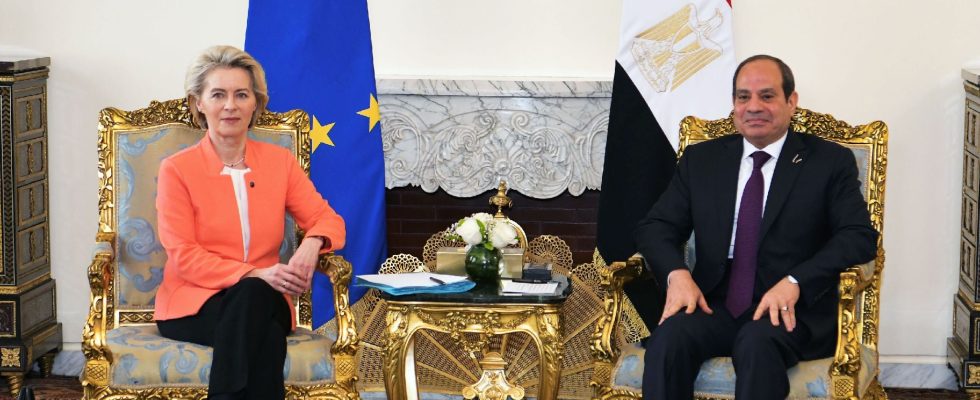7.4 billion euros: this is the amount of European aid allocated to Egypt by 2027. The President of the European Commission, Ursula von der Leyen, as well as five heads of state and government Europeans, traveled to Cairo this Sunday March 17 to sign a new partnership with Egyptian President Abdel Fattah al-Sissi to support the economy of the North African country.
The agreement includes “five billion euros in loans, including one billion paid before the end of 2024, 1.8 billion in investments, 400 million in aid for bilateral projects and 200 million in aid for programs addressing the issues migration,” a senior European Commission official told AFP, on condition of anonymity. The payment of aid should last until 2027.
With this agreement, “we are raising the relationship between the European Union and Egypt to the status of a global strategic partnership”, welcomed Ursula von der Leyen, referring to cooperation “ranging from trade to low-carbon energies through management migrations”.
Better border control
While Egypt is in serious financial difficulties, Europe fears that the conflicts in neighboring territories, in the Gaza Strip and in Sudan, will further weaken Cairo and cause an influx of migrants. clandestine to Europe. The partnership is part of a series of agreements between the EU and North African countries aimed at avoiding economic instability in Europe’s neighborhood and stopping irregular migration from Africa.
It follows other deals with Tunisia and Mauritania, which promised money and other incentives in exchange for better control of those countries’ borders. If Egypt has repeated since 2016 that no migrant boat has left its shores, the North African country is a transit point to Libya or Tunisia, from where boats leave for Italy. A manager involved in the development of the partnership declared At Financial Times : “We are concerned about two borders: the Sudanese-Egyptian border, where Sudanese enter the country, and the Egyptian-Libyan border, where people leave.”
The EU therefore wants to cooperate with Egypt – 136th country out of 142 in the World Justice Project’s global rule of law ranking – on security, counter-terrorism and border protection. But several human rights defenders have criticized this type of partnership. For the NGO Refugees Platform in Egypt (RPE), the EU wants to “subcontract to North African countries, in particular Egypt […] restriction of the freedom of movement of migrants”. The NGO claims to have “already recorded arbitrary arrests and ill-treatment inflicted by the Egyptian authorities on migrants, asylum seekers and refugees, as well as expulsions” towards countries plagued by violence.
Egyptian gas deal
Another issue of the agreement: the European Union wishes to “cooperate in the fields of energy, more particularly in the field of liquefied natural gas, to move even further away from Russian gas”, against the backdrop of the war in Ukraine, said a European official cited by AFP. This aid comes as Cairo is going through one of the worst economic situations in its history, facing difficulties in repaying its external debt, which has tripled in a decade to reach nearly $165 billion.
Egypt is currently the second country most at risk of defaulting on its debt, just behind war-torn Ukraine, and experts identify additional reasons for concern. The Egyptian economy was indeed hit hard by the Covid-19 pandemic, then by the war in Ukraine, which contributed to disrupting global supply chains, particularly in terms of agricultural products, causing significant inflation in the country. .
Economic difficulties
The war in the Gaza Strip is also a destabilizing factor for the Egyptian economy, whether it is tourism activity in the Sinai desert, or attacks by Yemen’s Houthi rebels in the Red Sea. These led commercial ships passing through the Suez Canal, a valuable source of foreign currency for Egypt, to find alternative routes. Revenues from the Suez Canal, which usually represent nearly 2% of Egyptian GDP, have “declined by 40% to 50%” in 2024, President Al-Sissi declared.
As recalled Al-Monitor, Egypt, on March 6, “increased its IMF bailout plan from an additional 5 to 8 billion dollars.” To meet the conditions, the government launched a recovery plan including a series of privatizations to attract foreign capital. Cairo, for example, concluded a pact with the United Arab Emirates worth $35 billion at the end of February for the development of a seaside resort, that of Ras Al-Hekma, on the Red Sea.
